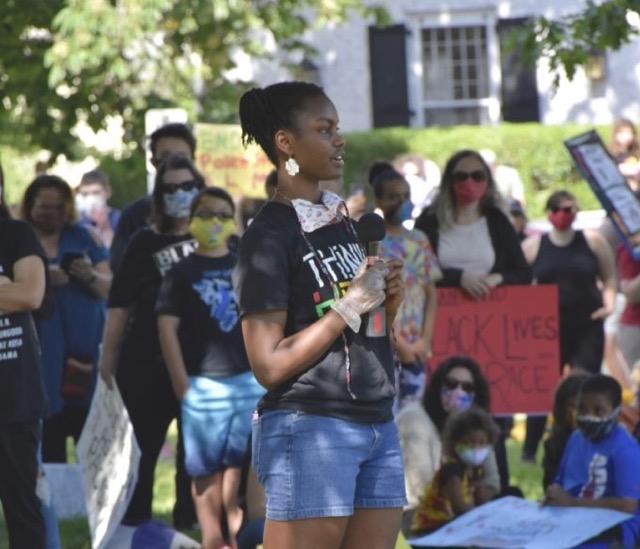Petua Mukimba, The Youngest Member Of Amherst Town Government, Reflects On the Work Of The Human Rights Commission

Amherst Regional High School Senior, Petua Mukimba, an organizer for Youth of Black Lives Matter, speaks at a rally on the Town Common in June. Photo: Art Keene
Petua Mukimba, senior at Amherst Regional HIgh School, began her experience on the Amherst Human Rights Commission in the fall of 2019. She is currently the youngest member on the Commission, and the only high schooler in Amherst Town government.
Mukimba first learned about the Commission from a poster at school. “I needed to do something, like volunteer, get a job, or something. [I thought] OK, I’ll do this,” she said. Although she did not know much about the Town government, she felt motivated to get involved.
“I wanted to know more about the government and thought that the Human Rights Commission is something that I like, so maybe I should just see how it works that way,” she said. She added that although she was familiar with the structure of our federal government, she knew very little about the decision-making process in her own community.
The Human Rights Commission’s mission statement states that its goal is “to insure that no person, public or private, shall be denied any rights guaranteed pursuant to local, state, and/or federal law on the basis of race or color, gender, physical or mental ability, religion, socio-economic status, ethnic or national origin, affectional or sexual preference, lifestyle, or age for all persons coming within the Town of Amherst.” In Mukimba’s experience, this entails attending monthly Commission meetings and taking action steps towards issues that arise during discussion.
Mukimba acknowledged her role in providing youth perspective during meetings. “The people [on the Commission] are adults. Some of their kids are in my grade,” she said. Other than that distinction, her work is relatively similar to that of other Commission members: discussing human rights issues, planning events, and being an active presence in the community.
“It’s mostly groups that come to us that have issues they want to resolve,” said Mukimba. When the Town receives a violation complaint, the Human Rights Commission decides how best to handle the situation, such as passing an act.
“The Asian-American community [recently] drafted a letter asking for the Human Rights Commission’s support against anti-Asian sentiment in the Town, especially at Amherst College, because that’s what was happening when the pandemic started. So we cosigned it,” said Mukimba. Other common topics of interest include voting, the Black Lives Matter movement, and housing inequities.
“Most of the events we’ve held are annual events that have been going on for awhile,” she said. She is excited about a new project to integrate anti-racism curriculum programs into the community.
Mukimba acknowledges that getting involved in government and policy-making can be challenging for young people. “Like with the climate activists that are saying we need to change things now, and then people respond like ‘Oh, you’re so inspiring, but we’re not going to change anything.’ That’s kind of what it feels like,” said Mukimba. But she stressed the importance of resisting stigma against youth in government. “When you’re working in government, or you participate in government, it’s really what you bring to the table that’s going to happen. With everything that’s going on in the world right now, it makes it all the more important for people to push their politicians or people in government to really act on the things they care about,” she said.
Mukimba expressed optimism toward a potential youth commission that would involve teenagers and young adults meeting regularly to discuss issues pertaining to their position in the greater Amherst community. Integrating young voices into a Town with a substantial population of young people is valuable, she emphasized.
“I think it’s important to make sure that there’s guidance, but also that the youth are actually making decisions, they’re actually making an impact on the community.” She noted that Holyoke’s Mayor Alex Morse began his political career as a youth commissioner.
Mukimba encourages young people to get involved in local government if interested. She also explained that this mentality offers a productive alternative to the smear campaigns and competition that typically characterize national politics, and said, “If you want to make that impact, you got to start in your own community. Really think about: what is the current state of the world, and where are we going, and how do you want to make sure we don’t go that way if you don’t like it.”
